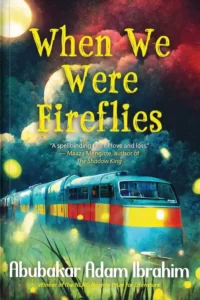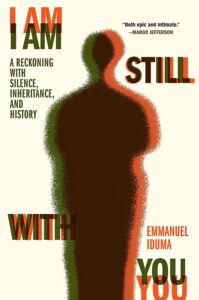America. Dusk. In this room with its own name, my dog and I sit, staring out the window. My son, watching me, blurts out: “Dad what are you going to do? All you do is stare out the window. I’m worried.” I tell him I’m fine. “No, you are not,” he says. “I’m worried about you.”
Many rivers run through us, and our children are beneficiaries or victims of their currents. A growing body of work is plumbing the complicated relationship between African immigrant fathers and their children, often sons born in America. The common thread is how the son has navigated the often-strained relationship. Think of Dreams from my Father by former US President Barack Obama, a deeply personal and spiritual narrative that tries to exorcise his and his late father’s demons. Obama wrote that book with his blood. Think of Tope Folarin’s beautiful nonfiction, “The Summer of Ice Cream,” or his book, A Particular Kind of Black Man. Think of Reggie Ugwu’s essay “My Father’s House,” and you are transported into a rabbit hole or two that the author and his siblings manage with dignity and equanimity. Yet nothing is new under the sun. Think of Okonkwo and Nwoye in Chinua Achebe’s Things Fall Apart. Think, also, of non-African immigrants in America, like Jhumpa Lahiri, who has defined the immigrant offspring’s narrative in her fiction; her essay, “Father’s Day, Juneteenth and True Liberation,” on why we need to expand our definition of fatherhood, shows how complex but loving these relationships are.
I am reading Will Jawando’s memoir My Seven Black Fathers for the second time, and as an immigrant father from Nigeria, with all four kids born in America, it speaks to me in multiple ways. Born in 1982 to a Nigerian father and a white American mother, Jawando is a community advocate and a political leader, currently Councilmember at the Montgomery County, Maryland Council. (Disclosure: I work on the same County Council, but not for him.) In this book, he processes his relationship with his often physically and emotionally absent father, while writing about six other black men who served as mentors and father figures to him. His are the heartbreaking struggles of an ultimately triumphant child, trying to make sense of a complex world, of being born into a war he did not ask for.
Jawando Senior is a “guarded and distant” man “whose own father had withheld love and attention from him.” He is also wrestling with a fading marriage and fading dreams of a great life in America. There’s a place in the University of New Hampshire where a Roy Roger’s restaurant used to be. There, every weekend, young Jawando would meet his father, now estranged from his family, and try in vain to extract some love and attention from him. “Without the stone memorials placed in the ground to commemorate these sites,” he writes, “Black men like me carry the heavy markers of absence in our memories. Suitcases and the echo of slammed doors. Someone you love turning their back on you and walking away, getting smaller and smaller until they disappear and a piece of you disappears with them.” Heady stuff.
On his own, Jawando Senior struggles to adapt from the binary world he grew up in to the more fluid one in the American Babylon. His descent into what seems like clinical depression is relentless, and he falls victim to a community where mental health issues are still misunderstood and discounted.
For the newly arrived African immigrant, the reality of life in the US can be traumatizing. Nothing prepares you for the racism, the various glass ceilings you must stare at, and the culture shock of negotiating relationships with your spouse and your children. The African man, long used to a patriarchy that benefits him, a sage on the stage paradigm that keeps his kids at an emotional distance, soon finds that he is not negotiating from a position of strength. He is accosted by conflicts from culture wars, at home, on the streets, at work. The sense of hopelessness takes a huge toll, and if he has no support system, as is often the case, the spiral into despair is inevitable. In Jawando Senior’s case, everyone suffered as a result.
The other men in young Jawando’s life exhibit range and depth in attitude and substance, but they are all connected by one constant, they have heart, and they empathize with his struggles. The stories around them are rich, like those in an African American barbershop. From his grade school teacher Mr. Williams to his mother’s friend Mr. Fletcher, to his high school coach Mr. Holmes, to the friend who engineers his reconciliation with his father Mr. Sanwoola, to Barack Obama, for whom Jawando worked as associate director of public engagement at the White House and who occasionally invited him to play basketball, the book offers a rich tapestry of the power of relationships and mentoring in molding a precocious, restless kid who is black. Without these men standing in for his father, he would have continued feeling “like I missed something only he could give me.”
This is an intimate portrait of a world at once simple and complex, drawn by a good writer with a good eye, who is also quite forgiving. I loved the depiction of people at Jawando’s mother’s place of work. Her office is a character in its own right. I am taken by the quiet courage that she and Jawando’s wife show; they ensured his success.
But an emotionally absent father and a struggling mother are only two of young Jawando’s issues. America is the third, being a black kid in a white world. He is recommended for Ritalin, a drug that would calm his alleged demons, while his similarly precocious white counterparts are recommended for gifted programs. This section reminded me of Dillibe Onyeama’s memoir Nigger at Eton, which chronicles his humiliating experience at the British school, and my eyes grew misty. Every day, many black children are brought into a world to fight wars they did not ask for. He scales up the discourse from the deeply personal to America’s systemic and ugly racism. But despite America’s dark reputation, the irony is that one of the most terrifying physical traumas he experienced, police brutality, happens in Nigeria.
Jawando’s prose exudes quiet confidence. He is adept at immersing the reader in whatever culture he’s in; you can taste it. He doesn’t pander: egusi is egusi, no footnotes explaining too much. Few writers capture the theatre that is the streets of Nigeria like Jawando has. In accepting his Nigerian name Opeyemi (Yemi), he comes to closure. (Years later, at his inauguration into the County Council, he wore an agbada, which he later donated to the Montgomery County Historical Society, where it is on display.)
I salute Jawando for navigating a multi-polar existence, an American struggling to understand his world in the shadow of a brooding father refusing to be consoled. He confronts his and his father’s anxieties with courage, dignity, and compassion. My Seven Black Fathers is a call to action—to understand and confront the evil that is racism, the toll that it takes on everyone, the costly effects on individual, family, and community mental health.
My other son texted me the other day; he’s joining a writing club. It is news to me that he is the writing type. What is he writing about? Is my relationship with him part of his musing? I have enjoyed being his father, but has he enjoyed being my son?
Buy My Seven Black Fathers. Open Country Mag may earn an affiliate commission from Amazon.




